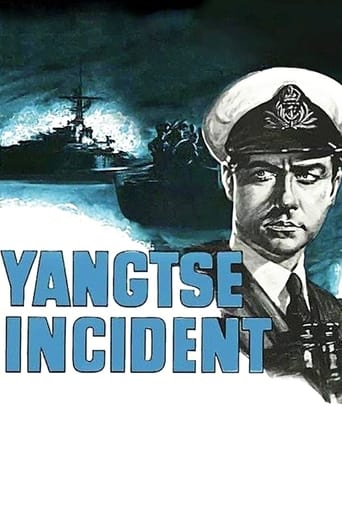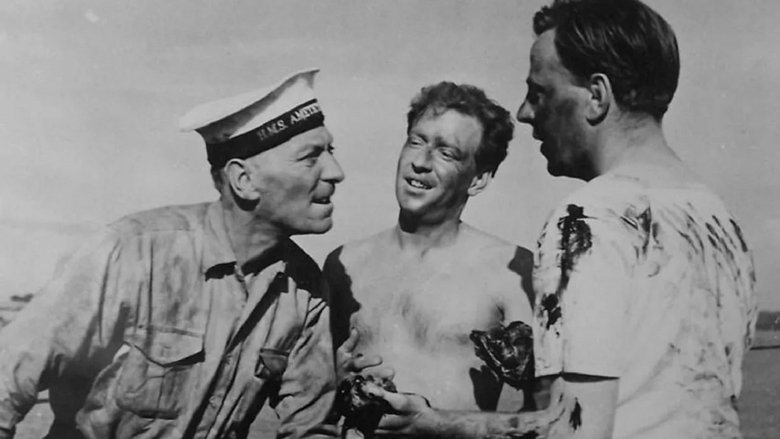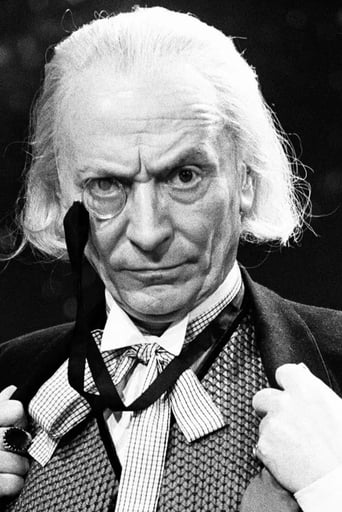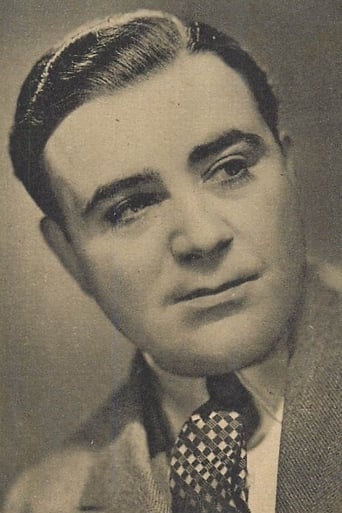

Yangtse Incident: The Story of H.M.S. Amethyst (1957)
While sailing lawfully up the Yangste in 1949, the British warship Amethyst found its return to the open sea blocked by Communist Chinese shore batteries that unexpectedly opened fire. In charge, Lietenant Commander Kerans was not however prepared for his crew and his ship to remain as a hostage for the Chinese to use as an international pawn.
Watch Trailer
Cast


Reviews
After a week of nearly trudging through this dry wartime drama about the attack on the British naval ship, the Amethyst, I have come to realize that what occurred on this ship – in real life – was probably more entertaining than this. Sure, the ship was grounded, shot upon first, and escaped heroically in the dark, but were 113 minutes without any true character development necessary? The question is posed, not just because of random modern day war stories (character driven, historically inaccurate action films), but because this film itself seemed aggressively made, though poorly created. The premise was convincing. The history was in place. The unknown was defined, yet it seemed to drag from one frame to the next. The intensity of the scenes was too thin, causing an apathetic feeling to befall this group of heroic sailors (from an audience perspective). It wasn't until our third act, when finally something happened, that we were caught back into what these men had to endure. "Yangtze Incident" is a copious war film, demonstrating real ships in action and an unknown "Dr. Who" for the time, but perhaps it was the direction of one Michael Anderson, or my lack of knowledge about this moment in history, but it just felt bland. There was no real thrill or danger in this film, and it distracted from the soul of the situation.What did work in "Yangtze Incident"? For me seeing those ships in acting, watching a slice of another country's involvement in WWII, and the cleverness of the officers to use their minds instead of guns to solve the situations at hand that created a decent film experience. It was when we slipped away from these great points that we lost focus with the film. "Yangtze Incident" wasn't bad, it just wasn't constructed well. When the Amethyst is first attacked, we spend nearly twenty minutes with stock footage with random inserts of the crew reacting to the obvious staged shots. Without warning, the ship is stopped and continued to be fired upon – Anderson, the director, may have been trying to give the audience the same feeling as the crew (the unanswered question as to why this cleared ship was fired upon) – but there wasn't anything connecting the incident to real life. From the opening shots, one knows that this is a film – a recreation of sorts, and the British Hollywood isn't afraid to keep it glossed over. It lacks that reality, or grittiness, that these heroes surely faced while abandoned in the middle of this river. The black and white cinematography does its best for the scenes, but the transfer watched was pathetic. The night scenes were too dark and I finally emerged just as happy to see the sunset as the crew was. Stronger lighting would have helped see that final moment of tension and fear.Both Richard Todd and William Hartnell do as well as possible with the light characters given. Todd keeps a sense of superiority to himself, while Hartnell continues to be the hard-working deckhand with a heart of gold. The scene in which he tries to make the girl smile is both heartwarming and the only chance we get to see the true nature of these men. My final issue with this film is the lack of focus on the heroes. These men did go through quite a bit to bring their boat to safety, and to see many of them regarded as secondary – it just felt shameful. I wanted to know these people, their lives, their histories, their mannerisms – but nothing but cardboard was decided.As historians, this is a film that needs to be watched. As a fan of classic foreign cinema, this was a difficult battle to win (no pun intended). "Yangtze Incident" felt slow, it felt shallow, and it was exciting – boring – and darkly exciting again. There was substance there, but it was unused throughout by both the director and the cinematographer. The horrible acting by Akim Tamiroff as a Chinese colonel was embarrassing. I cannot suggest this film to anyone. It was worth the singular viewing, but aside from that – it brought nothing new than history to the table. This was a film full of potential, lacking vision and dedication.Grade: ** out of *****
A splendid rendition of a true story. Richard Todd essentially does Guy Gibson at sea, arriving after the battle to save the ship.The battle sequences are exciting, and you really feel under fire as you watch the perplexed crew cope with the unexpected attack.Unfortunately the film was not shot anywhere near location, and it's pretty clear that we are seeing somewhere in England, not the far east! The naval action and later escape is thrilling, almost as good as "Battle of The River Plate" which remains the finest naval warfare film.We see the British humour of the time, best displayed by William Hartnell, who just about steals the show from Todd.
Excellent Black and White movie showing the courage and resourcefulness of the Royal Navy. Richard Todd's portrayal of Lieutenant Commander J.S. Kerans conveys the essence of what a British Naval Officer is, and has been since the time of Nelson. The only character who is poorly portrayed is the Chinese PLA Colonel, as this part was played by an obviously made up non-Chinese actor, weakening what is otherwise an outstanding film. The action scenes realistically convey the sense of uncertainty that occurs during a naval engagement in confined waters. The style is a good hybrid of documentary and typical 1950's WW2 movie, which works better than one might think. The use of the tattered "White Ensign" and the RN's song "Hearts of Oak", for the title music give the movie an old fashioned patriotic feel. Furthermore, the signals between the "Amethyst" and the Navy's C-in-C Far East Station, Hong Kong help avoid a tone of mawkishness or propaganda.
Brtiain during the 1950's (when it had an thriving film industry) produced a plethora of fine war films, usually in black and white which gave a documentary feel about them and added to the realism and usually used only British actors (When made in colour and Cinemascope and usually with an imported US star they felt more contrived- The Bridge on the River Kwai excepted) Many have gone on to become classics like Ice Cold in Alex, The Dam Busters, The Cruel Sea and Reach For The Sky.Yangtze Incident, the true story of the attack on HMS Amethyst by the Communist forces in China in 1949 is also one of the better ones and a bit unjustly forgotten about. It reunited Richard Todd with his Dam Busters helmer Michael Anderson and was produced by Herbert Wilcox (husband of Anna Neagle) shortly before he went bankrupt. The upper lips of the cast has never been stiffer but the heroics are natural and never overdone and the action scenes are tremendously exciting and all the better for using real and actual ships (The Battle of the River Plate for this reason is such a disappointment because the ships used bore little or no resemblance to the actual ones (exept one the INS Delhi is the actual HMS Achillies), especially the American heavy cruiser portraying the part of the Graf Spee}The acting of the cast is uniformly (sic!) excellent with Richard Todd giving once again a low key but nevertheless authoritative performance( he Jack Hawkins and Kenneth More seem to have the monopoly on this type of role)All in all a good film the king they don't make any more and a pleasant and relaxing way to while a way a couple of hours on a cold wet miserable Sunday afternoon.




